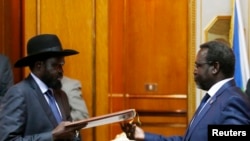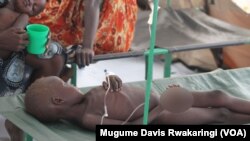NAIROBI —
South Sudan's stumbling peace process hit another bump in its rocky road Friday when the opposition refused to take part in the latest round of peace talks, saying their demands to make the negotiations more inclusive have been ignored by the mediators.
Opposition spokesman Hussein Mar Nyuot said his side did not attend the opening session of the talks in Addis Ababa Friday because a demand they lodged last week with the Intergovernmental Authority on Development (IGAD) -- asking that stakeholder groups that have fled the country or are based outside Juba be allowed to take part in the talks -- has gone unanswered.
“Unfortunately, we have not received any response to our letter and surprisingly we were just told yesterday that you just go to the hall and we are opening tomorrow and that’s all," Mar Nyuot said.
"They have not actually responded to us ... We are waiting. We are saying our participation is conditional with this, that we need to hear from IGAD concerning inclusivity,” he said.
Most of the civil society groups in Addis Ababa for the talks are organizations that have remained in Juba during the six months of unrest, Mar Nyuot said.
Opposition leader Riek Machar said in an interview with South Sudan in Focus this week that the groups that are present at the talks "probably are pro-government."
Presidential Spokesman Ateny Wek Ateny said it was unfortunate that the talks have stalled yet again. He said the delay was a ploy by the opposition to grab attention.
“If the rebels are threatening to pull from the peace talks, it is unfortunate and it is the IGAD mediators to be able to see how they can deal with such behaviors," Ateny said, adding "maybe this is another attention-seeking ploy."
Ateny said that government delegates will remain at the talks as IGAD figures out what to do next. Mar Nyuot said opposition delegates will return to the negotiating table in Addis as soon as their demands are met.
But the opposition spokesman also warned that the latest postponement of the talks could mean that a 60-day deadline agreed to last week for setting up a transitional government for South Sudan might not be met.
The delay to the talks is just one of many bumps on the road to peace in South Sudan.
The latest round of peace negotiations was supposed to start Monday, but was postponed after an IGAD official reportedly said President Salva Kiir and Machar were stupid if they thought they can win the conflict on the battlefield.
The government said it would not return to the negotiating table until it had an apology for the statement while Machar called the remark unfortunate but said it shouldn't prevent the peace talks from moving forward.
His main gripe was with the lack of inclusivity at the talks, Machar said.
The first agreement to lay down arms and stop the fighting in South Sudan was signed in January, but like the agreements that have come since then, it was violated before the ink was dry.
Under the terms of yet another agreement signed last week, Mr. Kiir and Machar agreed to set up a transitional government within 60 days.
But in a speech to South Sudan's National Assembly on Thursday, Kiir said he would only agree to the creation of an interim government if he were to be head of it.
Meanwhile, 1.5 million South Sudanese have been displaced by the conflict, a cholera outbreak in Juba has claimed dozens of lives, and the international community and aid agencies are warning that famine could hit the young nation, where more than seven million people are at risk of hunger and disease. U.N. Humanitarian Coordinator in South Sudan, Toby Lanzer, on Monday repeated a call for South Sudan's leaders to put their words into action and show that they mean business with the signing of yet another agreement to stop fighting and ensure that help reaches people who need it.
And in a letter sent last week to Mr. Kiir and Machar, 14 African elder statesmen, including South African Nobel laureate, Archbishop Desmond Tutu, demanded an immediate end to the violence.
"Over half of South Sudan’s population is at risk of starvation and 223,000 children are at risk of acute malnutrition. 50,000 of these children may not survive. The people of South Sudan need peace and security now, not more war!" the letter said.
Karin Zeitvogel contributed to this report from Washington, D.C.
Opposition spokesman Hussein Mar Nyuot said his side did not attend the opening session of the talks in Addis Ababa Friday because a demand they lodged last week with the Intergovernmental Authority on Development (IGAD) -- asking that stakeholder groups that have fled the country or are based outside Juba be allowed to take part in the talks -- has gone unanswered.
“Unfortunately, we have not received any response to our letter and surprisingly we were just told yesterday that you just go to the hall and we are opening tomorrow and that’s all," Mar Nyuot said.
"They have not actually responded to us ... We are waiting. We are saying our participation is conditional with this, that we need to hear from IGAD concerning inclusivity,” he said.
Most of the civil society groups in Addis Ababa for the talks are organizations that have remained in Juba during the six months of unrest, Mar Nyuot said.
Opposition leader Riek Machar said in an interview with South Sudan in Focus this week that the groups that are present at the talks "probably are pro-government."
Presidential Spokesman Ateny Wek Ateny said it was unfortunate that the talks have stalled yet again. He said the delay was a ploy by the opposition to grab attention.
“If the rebels are threatening to pull from the peace talks, it is unfortunate and it is the IGAD mediators to be able to see how they can deal with such behaviors," Ateny said, adding "maybe this is another attention-seeking ploy."
Ateny said that government delegates will remain at the talks as IGAD figures out what to do next. Mar Nyuot said opposition delegates will return to the negotiating table in Addis as soon as their demands are met.
But the opposition spokesman also warned that the latest postponement of the talks could mean that a 60-day deadline agreed to last week for setting up a transitional government for South Sudan might not be met.
Latest of many obstacles
The delay to the talks is just one of many bumps on the road to peace in South Sudan.
The latest round of peace negotiations was supposed to start Monday, but was postponed after an IGAD official reportedly said President Salva Kiir and Machar were stupid if they thought they can win the conflict on the battlefield.
The government said it would not return to the negotiating table until it had an apology for the statement while Machar called the remark unfortunate but said it shouldn't prevent the peace talks from moving forward.
His main gripe was with the lack of inclusivity at the talks, Machar said.
The first agreement to lay down arms and stop the fighting in South Sudan was signed in January, but like the agreements that have come since then, it was violated before the ink was dry.
Under the terms of yet another agreement signed last week, Mr. Kiir and Machar agreed to set up a transitional government within 60 days.
But in a speech to South Sudan's National Assembly on Thursday, Kiir said he would only agree to the creation of an interim government if he were to be head of it.
Meanwhile, 1.5 million South Sudanese have been displaced by the conflict, a cholera outbreak in Juba has claimed dozens of lives, and the international community and aid agencies are warning that famine could hit the young nation, where more than seven million people are at risk of hunger and disease. U.N. Humanitarian Coordinator in South Sudan, Toby Lanzer, on Monday repeated a call for South Sudan's leaders to put their words into action and show that they mean business with the signing of yet another agreement to stop fighting and ensure that help reaches people who need it.
And in a letter sent last week to Mr. Kiir and Machar, 14 African elder statesmen, including South African Nobel laureate, Archbishop Desmond Tutu, demanded an immediate end to the violence.
"Over half of South Sudan’s population is at risk of starvation and 223,000 children are at risk of acute malnutrition. 50,000 of these children may not survive. The people of South Sudan need peace and security now, not more war!" the letter said.
Karin Zeitvogel contributed to this report from Washington, D.C.









